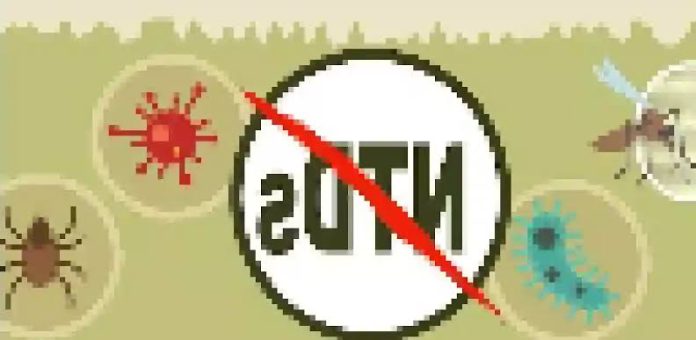By Palma Ileye
Federal Government, in its partnership with International Development Organisation, Sightsavers have said that Neglected Tropical Diseases, NTDs, would reach total elimination by 2027.
Speaking during a two- day National Trachoma Quarterly Review meeting in Abuja, the Deputy Director and Programme Manager, National Trachoma Elimination Programme, Ministry of Health, Dr. Nicholas Olobio said that based on the World Health Organization, WHO roadmap, it is hoped that by 2030, there will be total elimination of NTDs Trachoma inclusive.
Olobio added that in Nigeria, so much progress has been made especially in the elimination of Trachoma saying that, “it is expected of us, we are looking at 2027 atleast to eliminate the disease.”
He disclosed that so far, there was about 84% achievements since the elimination process began started stating that at initial stages, it was about 34% Additionally, informing that 38 million people were at risk of going blind but it has been reduced significantly to 3.7 million, while expressing satisfaction at the level of progress being made.
He explained that, “NTDs were a diverse group of 20 conditions that are mainly prevalent in tropical areas, where they affect more than one billion people who live in impoverished communities.”
Olobio noted that these diseases were “neglected” because they are almost absent from the global health agenda, receive little funding, and are associated with stigma and social exclusion.
He stated that Nigeria carried around 25 per cent of Africa’s NTDs burden, making it one of the most endemic countries in the world with these debilitating conditions.
Recall that a road map for neglected tropical diseases was launched in 2021.
The road map sets out global targets to prevent, control, eliminate, and eradicate a diverse set of NTDs and disease groups by 2030.
The road map aims to renew momentum, proposes strategies that intersect multiple diseases, and advances actions focused on integrated platforms for the delivery of interventions.
He said, “Based on the World Health Organisation roadmap, it is for us to eliminate NTDs, including trachoma by 2030, but for us in Nigeria, we have made so much progress and we are looking at 2027 to eliminate the diseases.
“So far, we have done about 85 per cent because we have had about when we started we had about 38 million Nigerians at risk of going blind due to Trachoma, but it has been reduced significantly to about 3.7 million Nigerians, so you will see that a lot of progress has been made, with support from our partners. So you can see it is a lot of progress the program has made.”
He revealed that all States in the country were working in partnership with the Local Government Areas to implement strategies, and guidelines, and carry out activities towards the elimination of NTDs.
“We have guidelines and all the states follow the guidelines and that is why we have achieved so much progress,” he added.
He said, “Adamawa, Ebony, Bauchi, Kano and Katsina States have made progress in achieving progress towards the elimination of NTDs adding that, Medicines alone cannot deal with NTDs, but we inculcate water, sanitation, hygiene, and behavioural change. People need to stop the practice of open defecation. Even in Abuja, there is open defecation. So we must look for ways to change people’s behaviour so that they can improve their ways of sanitation.”
Also, the Chairman of the National Trachoma Taskforce and Sightsavers Global Trachoma Mapping Epidemiologist, Prof Caleb Mpyet, said the meeting will help to review the level of SAFE strategy for trachoma implemented in each state as recommended by the WHO.
Mpyet called for more emphasis to be made on the WASH Program and to leverage on other programs that will help in the elimination process.
He explained, “Trachoma is the leading infectious cause of blindness worldwide. It is caused by an obligate intracellular bacterium called Chlamydia trachomatis.
“The infection is transmitted by direct or indirect transfer of eye and nose discharges of infected people, particularly young children who harbour the principal reservoir of infection.
“These discharges can be spread by particular species of flies. Elimination programmes in endemic countries like Nigeria are being implemented using the WHO-recommended SAFE strategy.
“This consists of surgery to treat the blinding stage (Trachomatous Trichiasis); antibiotics to clear infection; facial cleanliness; and environmental improvement, particularly improving access to water and sanitation.”
The Professor said a lot of progress has been made in Nigeria and some States have reached the elimination stage.
“For instance, Benue State, and Bauchi State are nearing elimination and hopefully they will get there by the end of this year. Jigawa State is also making a lot of progress. If there is any state that we may still be working on after this year, it may be Borno and Yobe States where insecurity has been a problem,” he said.
On Nigeria eliminating NTDs by 2027, he said, “Usually in life, you set your target and if you do not reach there, you reach somewhere near. We had some setbacks because of the COVID-19 pandemic and that brought us back by two to three years. So if we do not meet the target by 2027, we may reach the target by 2029.”
At the meeting, presentations made from the States recommended that the above measures for the elimination of NTDs should be strictly practiced and adhered to, also emphasizing on the use of WASH/FE to sustain the elimination process of Trachoma.
There was also the presentation of Awards by the Ministry of Health to States that have put in efforts and achieved certain milestone in the fight to eliminate Trachoma and NTDs. The Awards is to spur them to do more.







